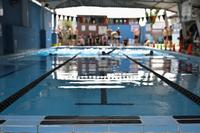For years, there has been a debate about the usefulness of a short nap in the early afternoon. Is it beneficial, detrimental or a needed break in the average stressful day we all endure daily? Napping has been associated with laziness for years, but given the health benefits of a short nap, you may want to try it.
The good news is that some studies agree on all of the above. It can be beneficial to alertness and fighting fatigue, but it can also be detrimental to our natural sleep patterns, which are more important for our overall health and well-being.
A good night's sleep is our No. 1 recovery tool for optimal physical and mental performance and longevity. The old saying "well rested, well tested" is supported by recent studies.
But life, and especially military life, don't always allow for a full night's rest. While the Defense Health Agency recommends U.S. service members get 7-8 hours sleep each night, troops on deployment tend to average between five and six, with few reporting the time to nap during the day.
Napping is a popular way to reenergize, and recent studies have shown that taking an occasional nap can benefit your health. It's no wonder that U.S. troops are experts at falling asleep anytime, anywhere; heck, even the Army encourages soldiers to take "the longest nap possible" when time permits.
So how healthy are naps? Here is what the data says:
- The National Sleep Foundation recommends taking a 20- to 30-minute nap early to midafternoon if you feel drowsy. It also says to avoid naps after 3 p.m., and that napping for longer can leave you feeling more tired and less productive for the rest of the day.
Shorter naps are associated with improved alertness, better mood and performance, memory improvement and increased productivity. Additionally, napping has been shown to improve mood, reduce stress and increase cognitive performance. - A recent study published in Sleep Health analyzed data from people ages 40-69 and found a link between habitual napping and larger total brain volume, which can reduce the risk for dementia and other neurological aging diseases.
- In the book "Why We Sleep" by Matthew Walker, sleep is discussed as a necessary part of a healthy lifestyle, as it is tied directly to human performance, productivity, alertness, happiness and reduced risks from many of today's top ways to die, such as heart attack, stroke, diabetes, dementia, Alzheimer's disease, some cancers and more.
No Time to Nap? Get a Better Night's Sleep
Naps are not the ideal answer to being more alert and awake in the day, but in today's "underslept" society, it may be needed. However, a good night's sleep is the ultimate goal, and here are some ways to improve your sleep:
- Set your bedtime alarm. Just like waking up in the morning with an alarm, set an alarm to begin your nighttime ritual. And strive to go to bed and wake up at the same time each day as much as possible.
- A nighttime ritual is key. Do the same thing as you would do with a young child. Try a warm bath, reading and make the last 30-60 minutes of the evening screen free and relaxing. That means no TV, computer or phones.
- Your bedroom is for sleeping. Keep it dark and quiet. Use an eye mask or earplugs, if necessary. Keep the room cool, if possible. If not, take a cool bath or shower before going to sleep in order to get comfortable and make it easier to fall asleep.
- Thoughts can keep you awake. Whether you are worried about tomorrow or upset with the day's events, write these thoughts on a "tomorrow to-do list." If you can't get to sleep, try going to a relaxing place in your head and thinking about, "What am I going to think of next?" Sometimes that is a trick that allows the brain to stop thinking about anything. This is similar to when someone says, "Tell me a joke." You probably know dozens of jokes but cannot think of anything when prompted.
This is a way to be more relaxed and present with your thinking, versus worrying about future or past events. This is also a useful meditation practice to clear your mind of intrusive thoughts. - You should exercise daily but get it done 2-3 hours before you go to sleep. It can keep you awake and more alert. That is why one of the best times to exercise before a night shift is the last hour or two prior to working nights.
- Avoid caffeine, alcohol and nicotine in the late afternoon or at dinner. All of these substances interfere with sleep. Avoid them late in the day, especially if you have to wake up early.
So if you're tired during the day, don't reach for that cup of coffee. Take 10-20 minutes and nap instead. Or do both: take a "nappuccino" by drinking caffeine and immediately taking a nap. By the time the caffeine kicks in, your nap is done (around 20 minutes); perfect timing to get the double dose of feeling alert and less fatigued.
References for more information:
- Human Sleep Science
- More info on Matthew Walker
- Sleep Foundation
- National Institute of Neurological Disorders and Stroke
Stew Smith is a former Navy SEAL and fitness author certified as a Strength and Conditioning Specialist (CSCS) with the National Strength and Conditioning Association. Visit his Fitness eBook store if you're looking to start a workout program to create a healthy lifestyle. Send your fitness questions to stew@stewsmith.com.
Want to Learn More About Military Life?
Whether you're thinking of joining the military, looking for fitness and basic training tips, or keeping up with military life and benefits, Military.com has you covered. Subscribe to Military.com to have military news, updates and resources delivered directly to your inbox.



















